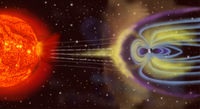|
|
| |
|
|
| |
|
|
|
|
| |
 |
The magnetosphere
shields the surface of Earth from the charged
particles of the solar wind.
(image not to scale.) |
Earth Sciences
Earth science is an all-embracing term for the sciences
related to the planet Earth. Earth science may also be
called geoscience.
It is a broader term than geology because it includes
aspects of planetary science, which is part of
astronomy. The Earth sciences include the study of the
atmosphere, oceans and biosphere, as well as the solid
earth. Typically Earth scientists will use tools from
physics, chemistry, biology, chronology and mathematics
to understand the Earth, and how it evolved to its
current state.
If there is one fact which underlies all Earth science
it is this; the Earth is an ancient planet which has
been changing the whole time since its formation. The
extent of the changes is much greater than people used
to think. |
|
Fields of study
The following disciplines are generally recognised as
being within the geosciences: |
- Geology describes the rocky parts of
the Earth's crust (or lithosphere) and its historic
development. Major subdisciplines are mineralogy and
petrology, geochemistry, geomorphology, paleontology,
stratigraphy, structural geology, engineering geology
and sedimentology.
- Geophysics and Geodesy investigate
the shape of the Earth, its reaction to forces and its
magnetic and gravity fields. Geophysicists explore the
Earth's core and mantle as well as the tectonic and
seismic activity of the lithosphere.
- Soil science covers the outermost
layer of the Earth's crust that is subject to soil
formation processes (or pedosphere).
- Oceanography and hydrology (includes
limnology) describe the marine and freshwater domains of
the watery parts of the Earth (or hydrosphere). Includes
Marine biology.
- Glaciology covers the icy parts of
the Earth (or cryosphere).
- Atmospheric sciences cover the
gaseous parts of the Earth (or atmosphere) between the
surface and the exosphere (about 1000 km). Major
subdisciplines are meteorology, climatology, atmospheric
chemistry and physics.
- Astronomy includes the study of
distant stars and galaxies to the examination of the 4.6
billion years old Earth from an astronomical point of
view. It is also closely related with the study of the
solar system and its planets, a subdiscipline called
planetology. A more distant relative of astronomy is
physical cosmology, which aims to study the Universe as
a whole.
- Closely related to the earth
sciences are physical geography and biology.
|
|
List of Earth science topics
Atmosphere |
- Atmospheric chemistry
- Climatology
- Meteorology
- Paleoclimatology
|
|
Biosphere |
- Biogeography
- Paleontology
- Micropaleontology
|
|
Hydrosphere |
- Hydrology
- Limnology
- Hydrogeology
- Oceanography
- Marine biology
- Paleoceanography
- Physical oceanography
|
|
Lithosphere or geosphere |
- Geology
- Environmental geology
- Historical geology
- Planetary geology
- Sedimentology
- Stratigraphy
- Structural geology
- Geography
- Physical geography
- Geochemistry
- Geomorphology
- Geophysics
- Geodynamics (see also Tectonics)
- Geomagnetics
- Seismology
- Glaciology
- Mineralogy
- Crystallography
- Petrology
- Volcanology
|
|
Pedosphere |
|
|
|
Systems |
- Environmental science
- Geography
- Gaia hypothesis
|
|
Others |
- Cartography
- Geostatistics
- Geodesy
|
|
|
|
|
|
|
|
|
|
|
|
|
|
|
|
|
|
|
Search Fun Easy English |
|
|
|
|
|
|
|
|
|
|
|
|
|
|
|
About
Contact
Copyright
Resources
Site Map |